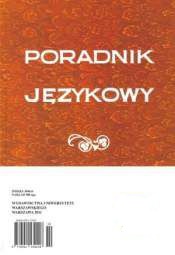INNY W OCZACH XVI-WIECZNYCH POLAKÓW (REKONESANS)
Inny (different) in the eyes of the 16th-century Poles (reconnaissance)
Author(s): Paulina Michalska-GóreckaSubject(s): Language and Literature Studies
Published by: Dom Wydawniczy ELIPSA
Keywords: 16th-century Poles
Summary/Abstract: The aim of this paper is an attempt to demonstrate who the 16th-century Poles living in a multi-ethnic and multi-religious country called inny (different) and an attempt to prove that the meaning of this lexeme expands under the infl uence of political and territorial transformations. In the 16th century, inny is not only ‘not this one, not such’, the meaning of this lexeme gets closer to the meaning of the lexeme obcy (strange), understood as ‘being from outside a given community (nation, culture)’, or of the lexeme apostata (an apostate) defi ned as ‘a dropout, a dissenter from the faith’. The rich lexicographic material of Słownik polszczyzny XVI wieku (Dictionary of the 16th-century Polish language) documenting the use of the adjective inny shows that, despite the ethnic and cultural as well as religious diversity of the large country, these notations refer mainly to religious issues. It can be inferred from the analysed material that religious diversity was more visible in the everyday life of a 16th-century Pole than ethnic diversity.
Journal: Poradnik Językowy
- Issue Year: 2015
- Issue No: 07
- Page Range: 32-42
- Page Count: 11
- Content File-PDF

